
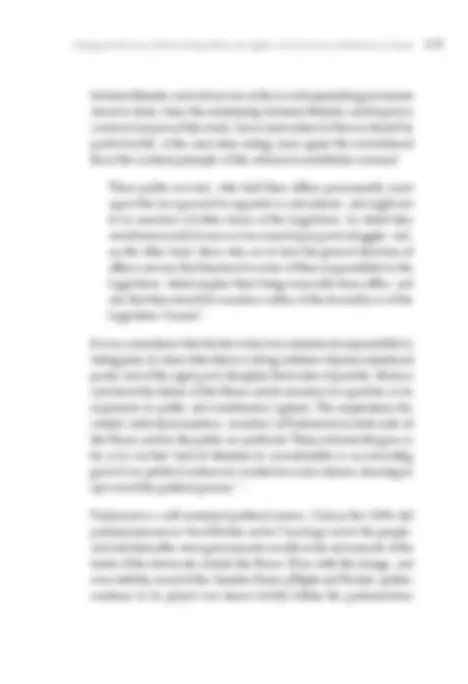
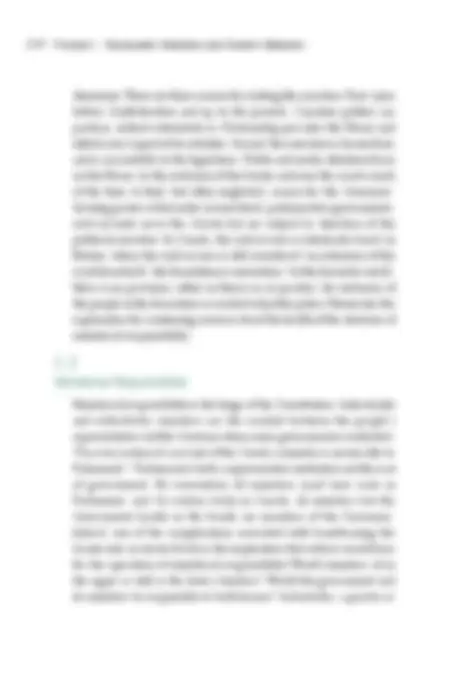
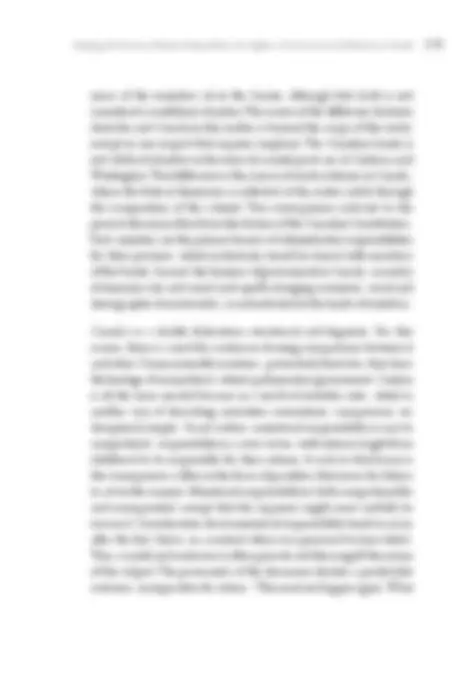
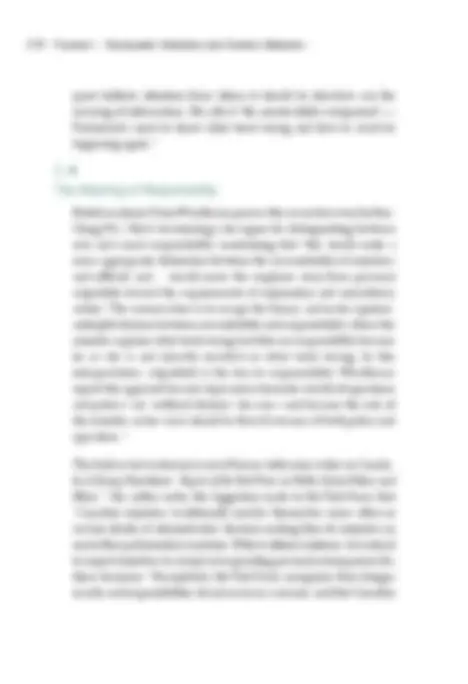

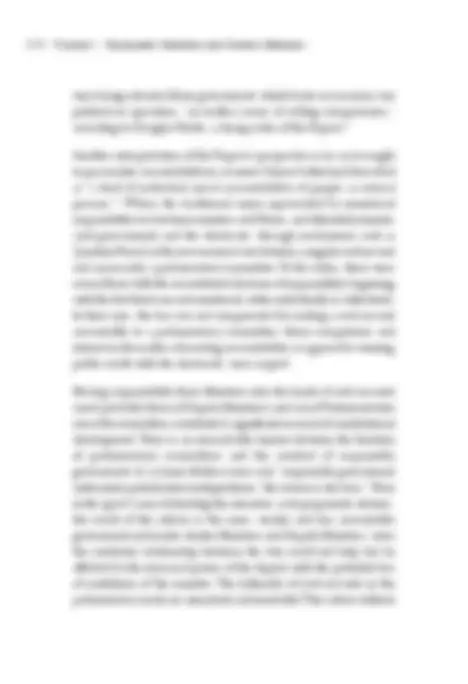
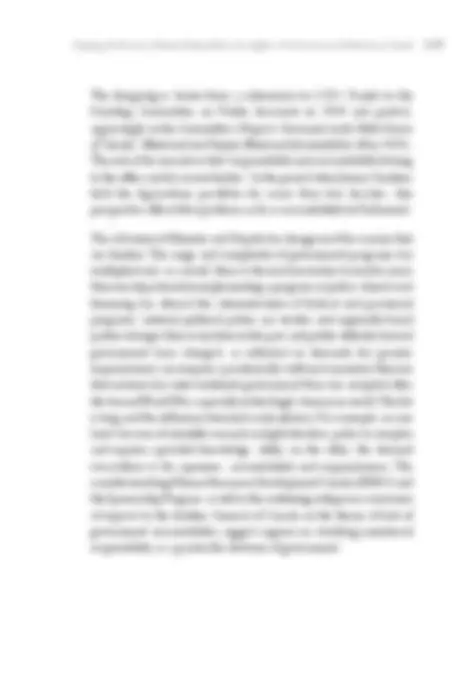
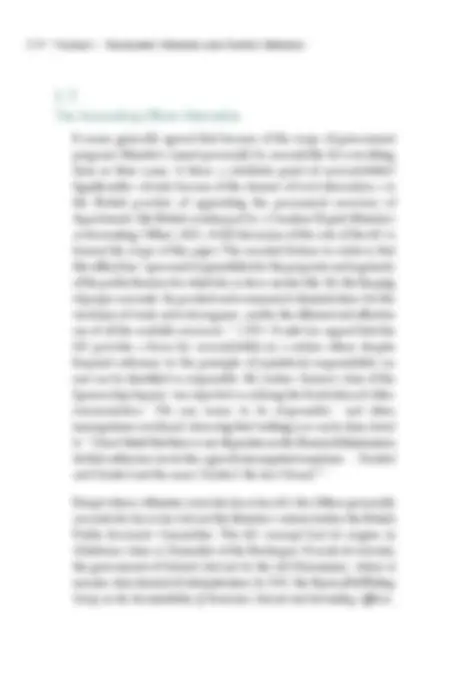
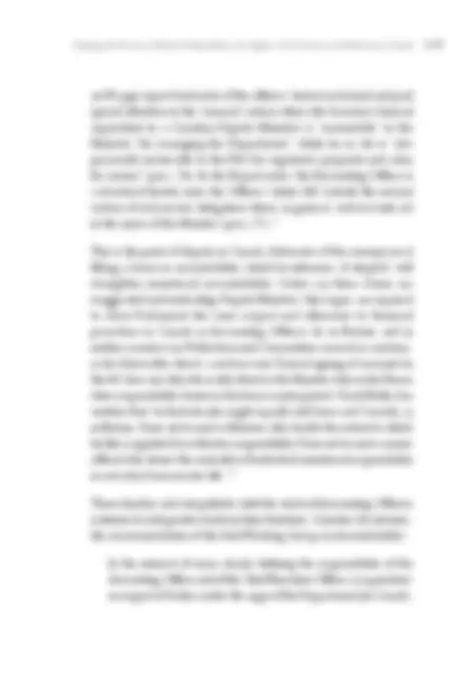
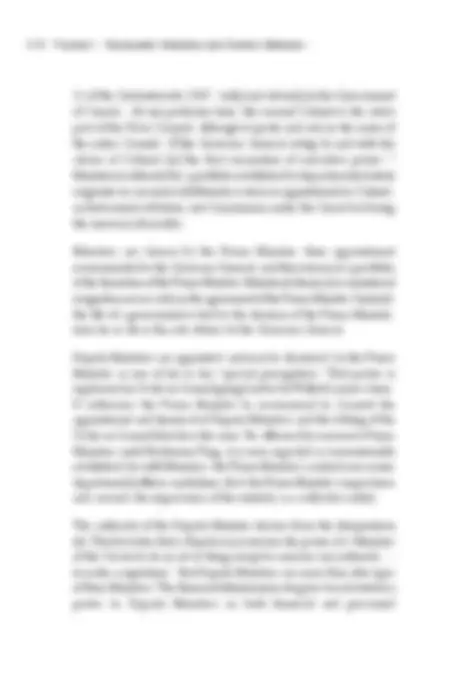
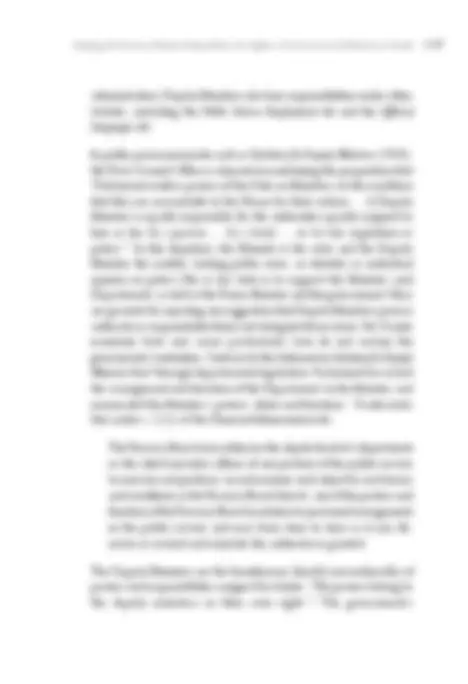
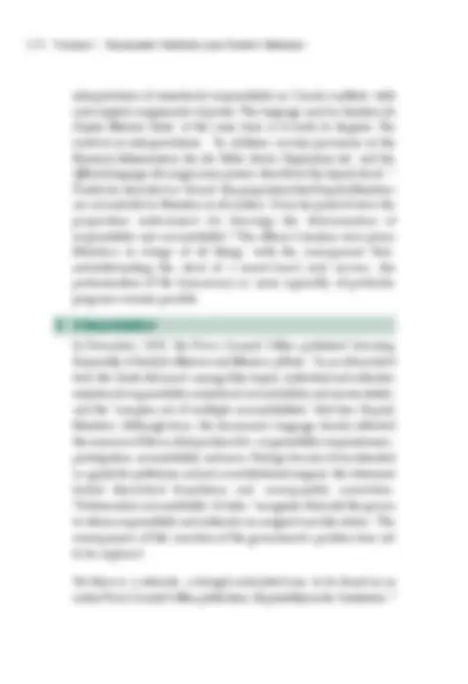
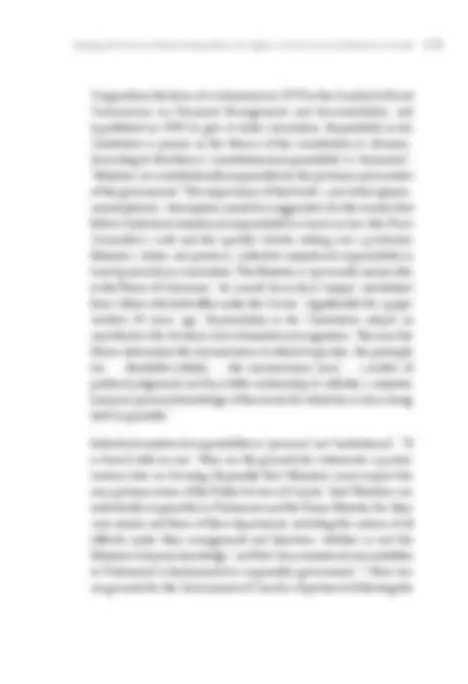
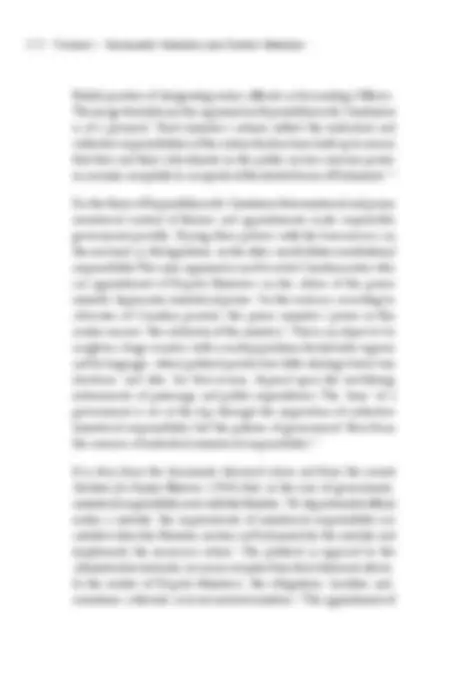
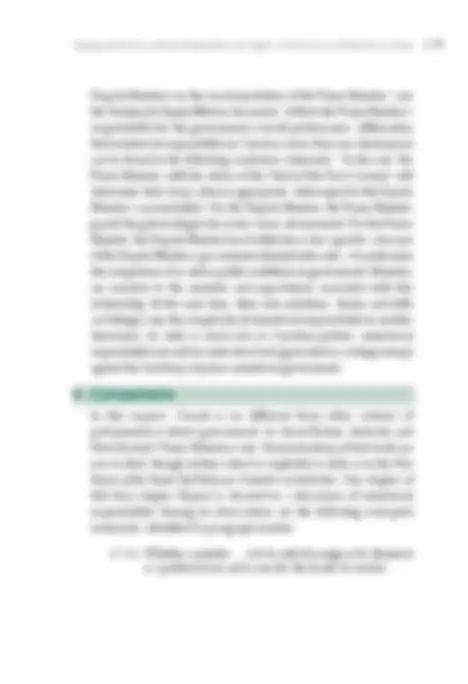
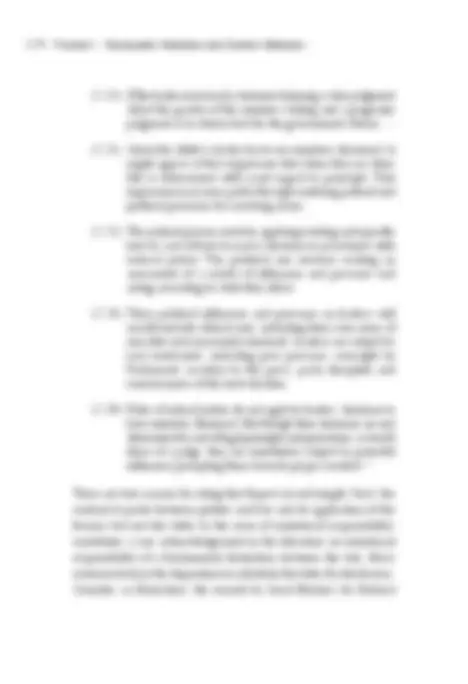
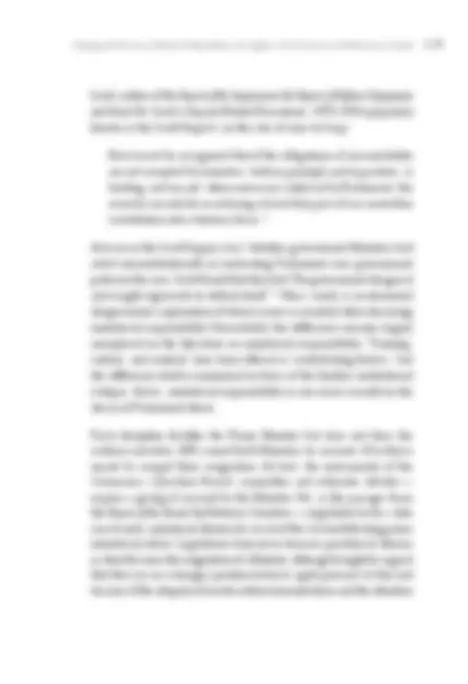
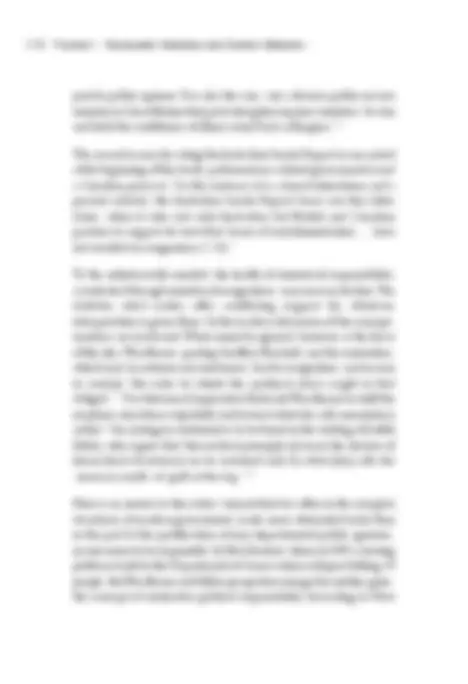
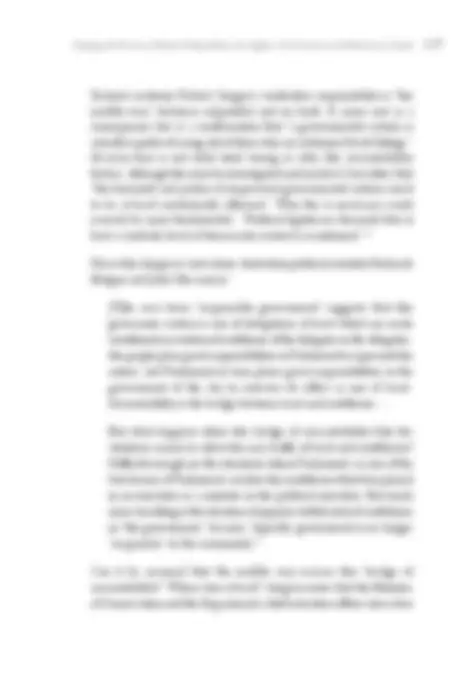
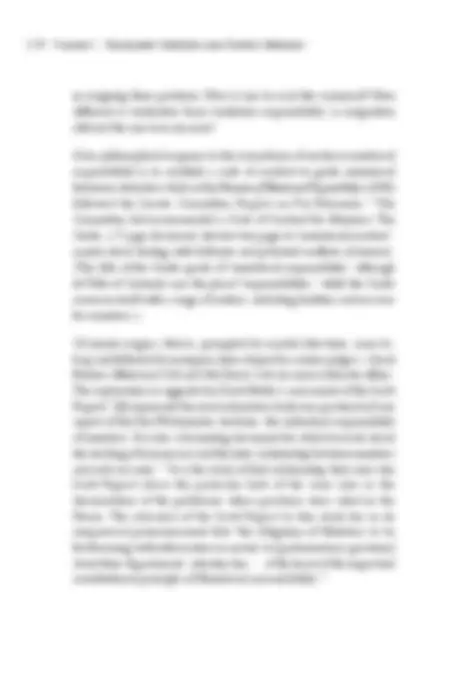
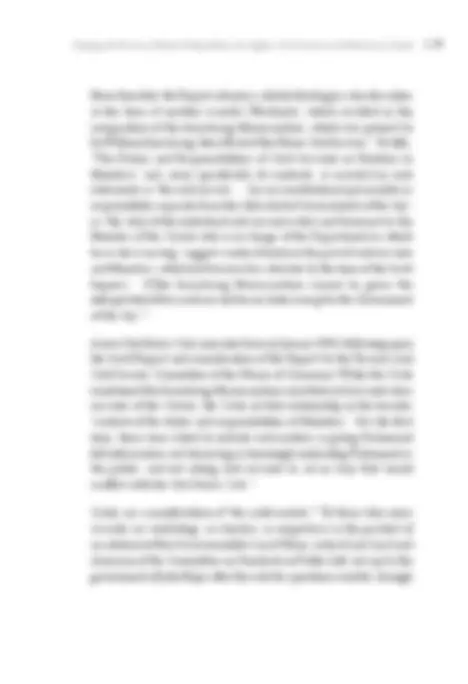
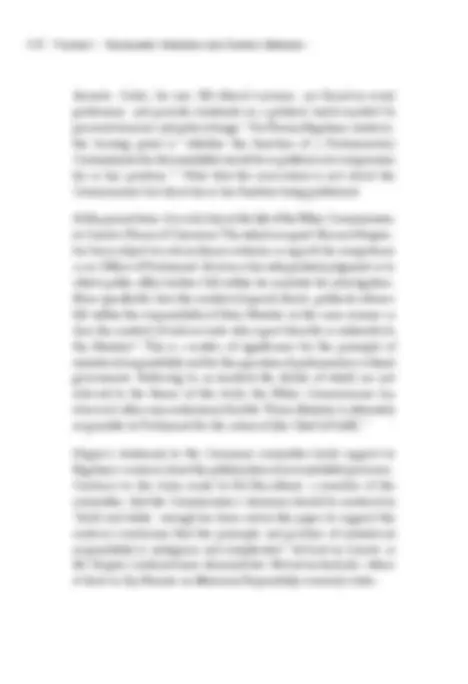
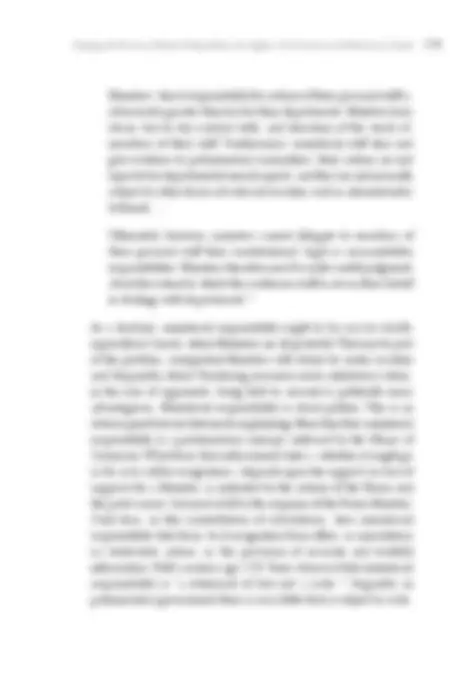
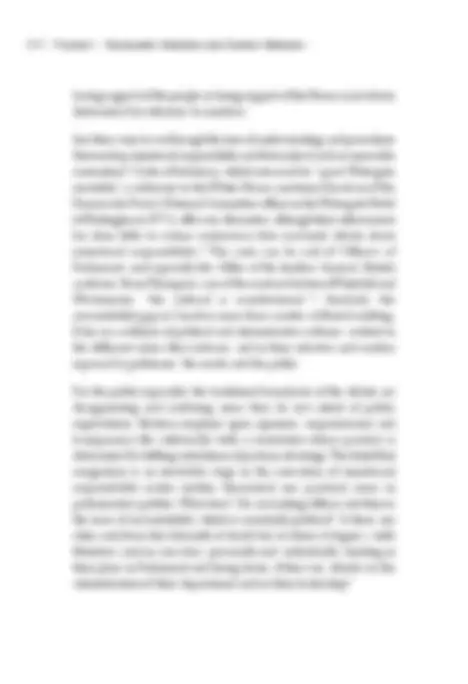
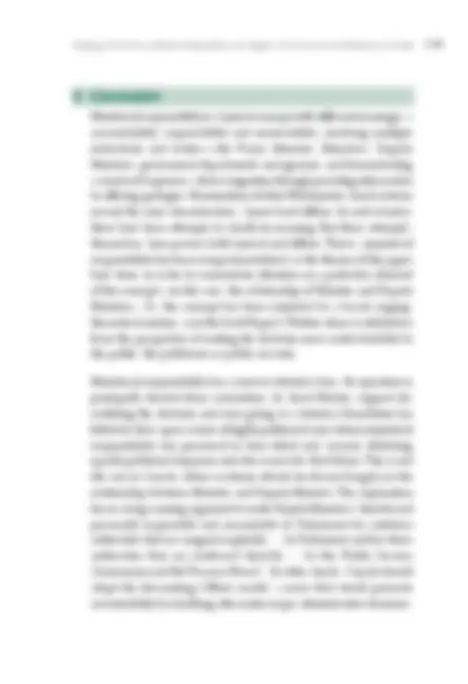
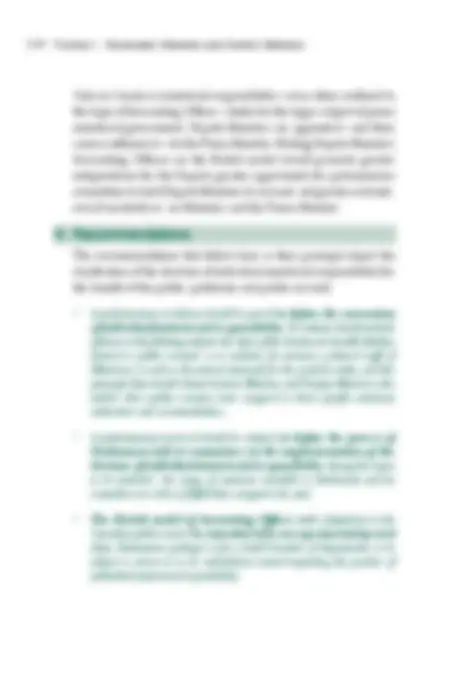

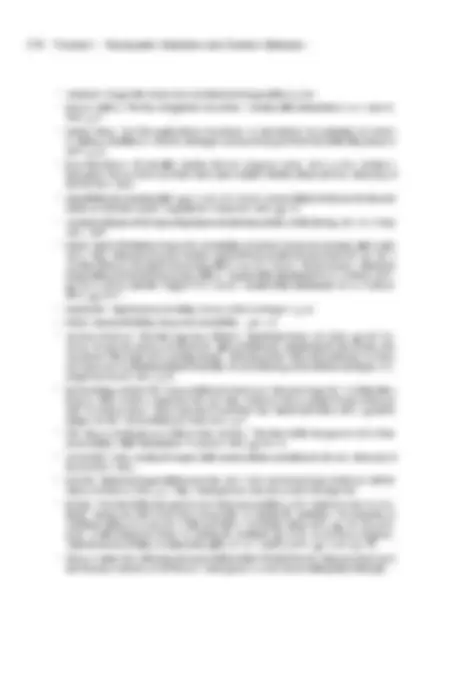

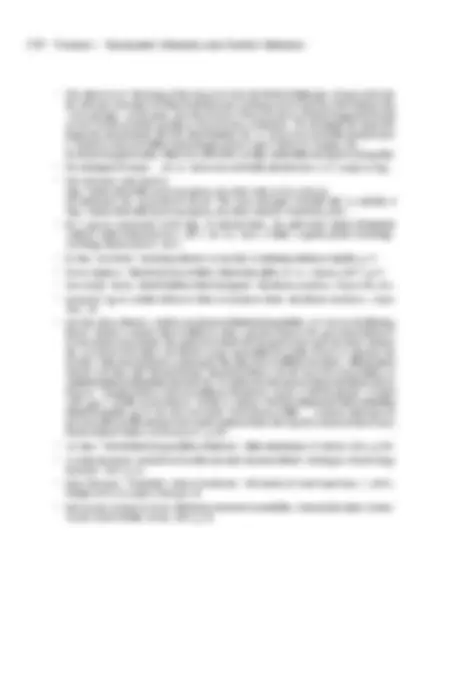
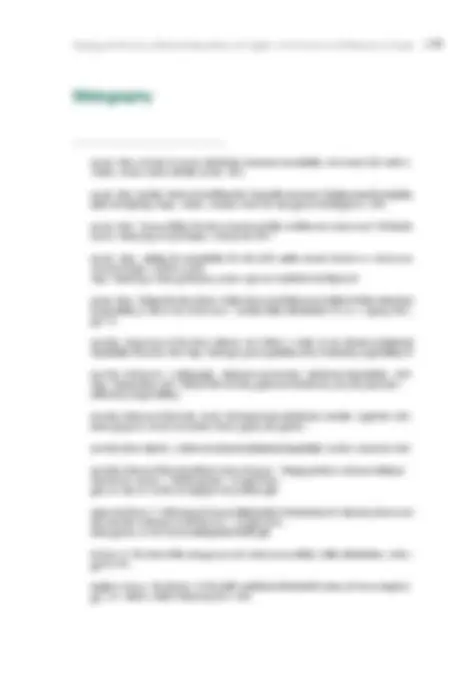
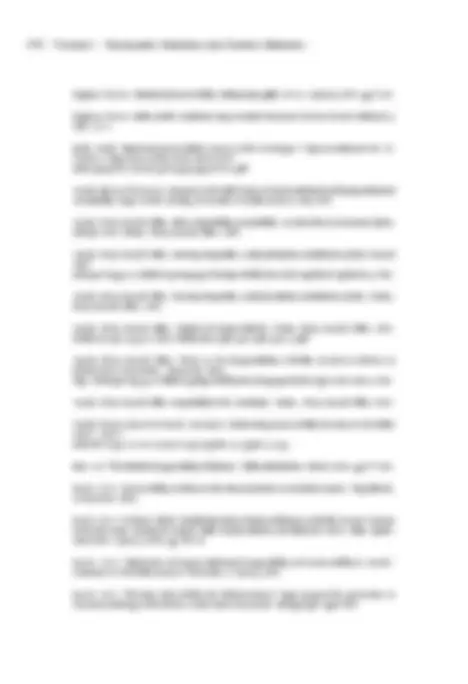

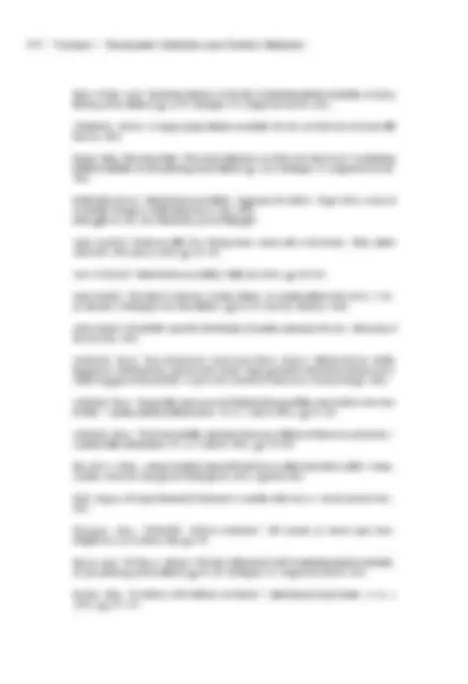
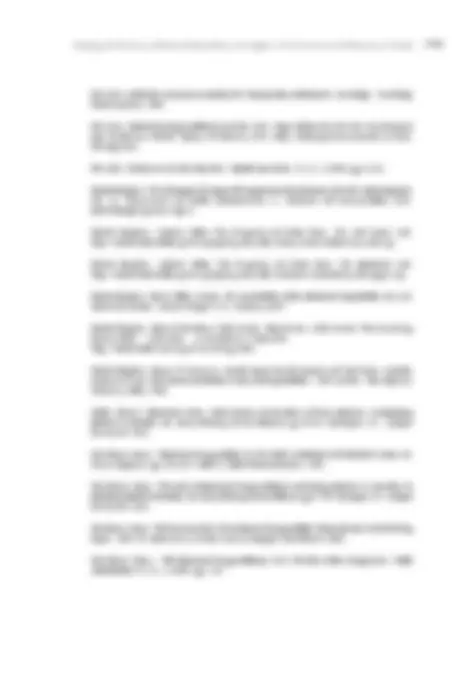



Study with the several resources on Docsity

Earn points by helping other students or get them with a premium plan


Prepare for your exams
Study with the several resources on Docsity

Earn points to download
Earn points by helping other students or get them with a premium plan
Community
Ask the community for help and clear up your study doubts
Discover the best universities in your country according to Docsity users
Free resources
Download our free guides on studying techniques, anxiety management strategies, and thesis advice from Docsity tutors
Here are grounds for rejecting any suggestion that Deputy Ministers possess authority or responsibility that is not delegated from above.
Typology: Exercises
1 / 44

This page cannot be seen from the preview
Don't miss anything!





































Introduction: The Constitutional Doctrine of Ministerial Responsibility
In academic studies, comparisons between Canada and other countries based on the Westminster model, that is, the United Kingdom,Australia and New Zealand, are so familiar as not to elicit comment.Yet they should, for together these countries stand apart in sharing—virtually replicating—a constitutional, legal and linguistic inheritance. Of course, there are differences among the quartet: Canada and Australia are federations, the United Kingdom and New Zealand unitary systems.
101
But it is the similarities that attract, none more so than the fact each is a monarchy that shares a common sovereign.
The relevance of a common constitutional legacy and similar governmental institutions is this: the frame for political discussion is much broader than is found in countries with singular constitutions, such as the United States and France.At the same time, the scope for variation in relations that obtain between Minister and Crown, or minister and legislature, or minister and civil service—the component elements of constitutional monarchy—is extensive. Constitutional monarchy operates largely by means of conventions, what John Stuart Mill described as the unwritten maxims of the constitution. For that reason, advice, consultation and understandings play a critical part in arriving at decisions.The same indeterminate atmosphere pervades the conduct of the Commons on matters of great importance. Consider, for instance, the “Speaker’s Ruling on the Application of the Progressive Conservative Democratic Representative Coalition for Recognition in the House of Commons,” in which Speaker Milligan commented: “In matters relating to the status or designation of individuals or groups in the House, the House makes its own decisions without necessarily limiting itself to standards and definitions used outside the House of Commons.”^1
In a Westminster system, constitutional principles are largely unwritten and generally non-justiciable. The Constitution Act , 1867, constitutes the federal union with fewer than half its sections devoted to the structure and operation of the executive and legislature. Responsible government does not appear, its provenance instead a simple instruction in 1847 from the Colonial Secretary (Earl Grey) to Nova Scotia’s governor (Sir John Harvey), to the effect that in future the governor select as his advisers those who controlled the local assembly. The same communication contained a paragraph of direct relevance to the topic of ministerial responsibility. It spoke about the future place of the civil service and, more particularly, the relationship that should obtain
dimension.There are three reasons for making this assertion. First, since before Confederation and up to the present, Canadian politics are partisan, indeed extensively so. Partisanship pervades the House and infects every aspect of its activities. Second, the executive is drawn from and is accountable to the legislature. Public and media attention focus on the House, to the exclusion of the Senate and even the courts much of the time. A final, but often neglected, reason for the Commons’ drawing power is that under monarchical, parliamentary government, civil servants serve the Crown but are subject to direction of the political executive. In Canada, the civil service is statutorily-based; in Britain, where the civil service is still considered “an extension of the royal household,” the foundation is convention.^4 In this hermetic world, there is no provision, either in theory or in practice, for inclusion of the people in the formation or conduct of public policy. Herein lies the explanation for continuing concern about the health of the doctrine of ministerial responsibility.
Ministerial Responsibility Ministerial responsibility is the hinge of the Constitution. Individually and collectively, ministers are the conduit between the people’s representatives and the Crown in whose name government is conducted: “For every action of a servant of the Crown a minister is answerable to Parliament.”^5 Parliament is both a representative institution and the seat of government. By convention all ministers must have seats in Parliament, and, by custom today in Canada, all ministers but the Government Leader in the Senate are members of the Commons. Indeed, one of the complications associated with transforming the Senate into an elected body is the implication that reform would have for the operation of ministerial responsibility. Would ministers sit in the upper as well as the lower chamber? Would the government and its ministers be responsible to both houses? In Australia, a quarter or
more of the ministers sit in the Senate, although that body is not considered a confidence chamber.The source of the difference between Australia and Canada in this matter is beyond the scope of this study, except in one respect that requires emphasis.The Canadian Senate is not a federal chamber in the sense its counterparts are at Canberra and Washington.That difference is the source of much criticism in Canada, where the federal dimension is reflected at the centre solely through the composition of the cabinet. Two consequences relevant to the present discussion flow from this feature of the Canadian Constitution. First, ministers are the primary bearers of administrative responsibilities for their province, which in Australia would be shared with members of the Senate. Second, the business of government in Canada, a country of immense size and varied and rapidly changing economic, social and demographic characteristics, is concentrated in the hands of ministers.
Canada’s is a double federation—territorial and linguistic. For this reason, there is a need for caution in drawing comparisons between it and other Commonwealth countries, particularly Australia, that share the heritage of monarchical, cabinet-parliamentary government. Caution is all the more needed because in a world of invisible rules, which is another way of describing unwritten conventions, comparisons are deceptively simple. On its surface, ministerial responsibility is easy to comprehend: responsibility is a civic virtue, with citizens taught from childhood to be responsible for their actions. A coda to that lesson is the consequences (often in the form of penalties) that ensue for failure to act in this manner. Ministerial responsibility is both comprehensible and consequential, except that the sequence might more usefully be reversed. Consideration about ministerial responsibility tends to occur after the fact, that is, in a context where it is perceived to have failed. Thus, scandal and controversy often precede and then engulf discussion of the subject.The provenance of the discussion dictates a predictable outcome, an imperative for action: “This must not happen again: What
Governments resign when they are defeated; ministers, who in any case are not in a position to be “defeated,” do not resign.That at least is the conclusion to be drawn from statistics assembled by scholars in Canada, Australia and Great Britain. 8 Sharon Sutherland, in her study of 151 ministerial resignations in Canada between 1867 and 1990 found that only two ministers had resigned for “maladministration in their portfolio.” Eleven exited due to breaches of ethical standards, 28 due to lack of solidarity with their colleagues (for example, Lucien Bouchard’s defection from the Mulroney cabinet in 1990 over “the government’s method of dealing with constitutional change”) and 62 due to receiving a government appointment. David Butler’s statistics on ministerial resignations between 1901 and 1996 in Australia and Britain found 28 percent of resignations in the first (but only 15 percent in the second) due to “personal fault in a public capacity.” “Accepting blame for public servants” explained five percent of resignations in Great Britain but none in Australia.
Resignation is the measure and the meaning of ministerial responsibility—to the media, who need only to fix their focus on an individual, and to the public, who take their understanding of ministerial responsibility largely from the media. James Mallory, who wrote more on cabinet government in Canada than anyone in the last half of the 20th Century, assigned to resignation a “homiletic value.” 9 The more usual language is to say it is symbolic. Whether one attributes this response to a “blame culture,” a desire for metaphorical “public hangings”, or a “shooting gallery mentality” is of secondary importance to the predictable recurrence of the response and the equally predictable failure in all but a very small number of instances for that wish to be realized. 10 Noteworthy is Ken Kernaghan’s conclusion: emphasizing the need to resign even though it seldom happens “explains in large part the view that the doctrine of individual ministerial responsibility is dead or at least severely weakened.” 11 Kernaghan argues that the resignation
quest deflects attention from where it should be directed—on the securing of information. He calls it “the answerability component”— Parliament’s need to know what went wrong and how to avoid its happening again. 12
The Meaning of Responsibility British academic Diana Woodhouse presses this corrective even further. Using H.L. Hart’s terminology, she argues for distinguishing between role and causal responsibility, maintaining that “this would make a more appropriate distinction between the accountability of ministers and officials and… would move the emphasis away from personal culpability toward the requirements of explanation and amendatory action.”The concern here is to escape the binary, and in her opinion, unhelpful division between accountability and responsibility, where the minister explains what went wrong but takes no responsibility because he or she is not directly involved in what went wrong. In this interpretation, culpability is the key to responsibility. Woodhouse rejects this approach because it presumes hermetic worlds of operations and policy—an “artificial division” she says—and because the role of the minister, in her view, should be that of overseer of both policy and operation. 13
The fault or tort criterion is out of favour with some critics in Canada. In A Strong Foundation: Report of the Task Force on Public ServiceValues and Ethics ,^14 the author notes the suggestion made to the Task Force that “Canadian ministers traditionally involve themselves more often in certain details of administrative decision-making than do ministers in most other parliamentary countries. If this tradition continues, it is natural to expect ministers to accept corresponding personal consequences for these decisions.” Perceptively, the Task Force recognizes that changes in roles and responsibilities do not occur in a vacuum, and that Canadian
were being extracted from government, which by its very essence was political in operation, “an endless series of rolling compromises,” according to Douglas Hartle, a strong critic of the Report. 15
Another interpretation of the Report’s perspective is to say it sought to personalize accountability in a manner Sharon Sutherland described as “a kind of individual moral accountability of people as natural persons.” 16 Where the traditional union represented by ministerial responsibility was between ministers and House, and ultimately minister (and government) and the electorate, through mechanisms such as Question Period, in the new version it was between a singular civil servant and, necessarily, a parliamentary committee.To the critics, there were several flaws with the reconstituted doctrine of responsibility, beginning with the fact that it was not ministerial, either individually or collectively. In their eyes, the loss was not compensated by making a civil servant accountable to a parliamentary committee whose competence and interest in the matter of exacting accountability, as opposed to winning public credit with the electorate, were suspect.
Moving responsibility from Ministers into the hands of civil servants (most probably those of Deputy Ministers) and out of Parliament into one of its committees constituted a significant reversal of constitutional development. There is an unresolvable tension between the function of parliamentary committees and the conduct of responsible government: if, as James Mallory once said, “responsible government undermines parliamentary independence,” the reverse is also true.^17 Even in the “good” cause of checking the executive, as its proponents advance, the result of the reform is the same: weaker and less accountable government and maybe weaker Ministers and Deputy Ministers, since the symbiotic relationship between the two could not help but be affected by the increased power of the deputy with the potential loss of confidence of the minister. The hallmarks of civil servants in the parliamentary mode are anonymity and neutrality.They advise without
fear or favour ministers who decide the policy to adopt from choices presented. Much could be said as qualification to this general statement, but the values themselves are unequivocal. Equally important, they are realizable only in a climate of confidentiality.
Monarchical-cabinet government, based largely on unwritten conventions interpreted individually and personally, depends upon secrecy in order to promote candor among participants. The confidence that comes from the understanding that discussions and advice between Ministers and departmental officials are privileged cannot help but be compromised when those officials may be answerable to parliamentary committees. The relationship between Minister and Deputy is of a piece with the relationship between first minister and the Crown’s representative, the Governor General—private, personal and political (but not partisan). In this privileged milieu, accountability assumes a distinctive limited meaning—for example, to one principal and for one program. Hierarchy discourages dissemination of information and diffusion of authority.
Monarchical-parliamentary government is an important explanation for the disposition to resist diffusion in Canadian politics. Still, it is not the only explanation. Daniel Elazar has said of American federalism that it is neither centralized nor decentralized but rather non-centralized. 18 The same cannot be said, despite the perennial concern expressed at the perceived “Balkanization” and asymmetrical programs, of Canada’s federation. Donald Savoie has argued that to the extent power is concentrated, it is lodged in central agencies answerable to the Prime Minister. From the perspective of the central agencies, the maintenance of the federation, seen in terms of Quebec-Canada relations,Aboriginal and First Nations matters, the implementation and protection of civil and minority rights in the era of the Charter, or the enduring quest for regional equality, concentrates attention on matters of control, especially
The foregoing is drawn from a submission by C.E.S. Franks to the Standing Committee on Public Accounts in 2004 and quoted, approvingly, in the Committee’s Report, Governance in the Public Service of Canada: Ministerial and Deputy Ministerial Accountability (May 2005). The nub of his remarks is that “responsibility and accountability belong to the office and its current holder.” In the period when Jimmy Gardiner held the Agriculture portfolio for more than two decades, this perspective offered few problems as far as accountability to Parliament.
The old union of Minister and Deputy has disappeared for reasons that are familiar. The range and complexity of government programs has multiplied and, as a result, there is the need nowadays to involve more than one department in implementing a program or policy; shared-cost financing has altered the administration of federal and provincial programs; national political parties are weaker and regionally-based parties stronger than at any time in the past; and public attitudes toward government have changed, as reflected in demands for greater responsiveness, in company, paradoxically, with new monetary theories that envision less interventionist government than was accepted after the Second World War, especially in the Anglo-American world.The list is long and the influences itemized contradictory. For example, on one hand, because of scientific research and globalization, policy is complex and requires specialist knowledge, while, on the other, the demand everywhere is for openness, accountability and responsiveness. The scandals involving Human Resources Development Canada (HDRC) and the Sponsorship Program, as well as the continuing critique in a succession of reports by the Auditor General of Canada on the theme of lack of government accountability, suggest urgency in clarifying ministerial responsibility as a practicable doctrine of government.
The Accounting Officer Alternative It seems generally agreed that because of the scope of government programs Ministers cannot personally be accountable for everything done in their name. Is there a substitute point of accountability? Significantly—if only because of the absence of rival alternatives—is the British practice of appointing the permanent secretary of departments (the British counterpart to a Canadian Deputy Minister) as Accounting Officer (AO). A full discussion of the role of the AO is beyond the scope of this paper. The essential feature to relate is that this official has “a personal responsibility for the propriety and regularity of the public finances for which he or she is answerable; for the keeping of proper accounts; for prudent and economical administration; for the avoidance of waste and extravagance; and for the efficient and effective use of all the available resources.” 20 C.E.S. Franks has argued that the AO provides a focus for accountability in a system where despite frequent reference to the principle of ministerial responsibility, no one can be identified as responsible. Mr. Justice Gomery, chair of the Sponsorship Inquiry, was reported as echoing the frustration of other commentators: “No one seems to be responsible;” and when incompetence was found, observing that “nothing is or can be done about it.” “I don’t think that there is any disposition in the Financial Administration Act that authorizes you to fire a grossly incompetent employee… I looked and I looked and the more I looked, the less I found.” 21
Except where a Minister overrules his or her AO, the Officer personally accounts for his or her but not the Minister’s actions before the British Public Accounts Committee. The AO concept had its origins in Gladstone’s time as Chancellor of the Exchequer. It made its way into the government of Ireland (but not to the old Dominions), where it remains a key element of administration. In 2002, the Report of theWorking Group on the Accountability of Secretaries General and Accounting Officers ,
Crown Corporations, or executive agencies, for example], which are in receipt of Exchequer funds,their respective roles and the framework and processes of accountability should be set down in writing.^24
As with prerogative powers, convention, privilege, ethics, conduct, and now ministerial responsibility, the pressure for change is in one direction only—toward codification of a “new administrative law” and justifiable action. In consequence, Officers of Parliament go to court, while members of Parliament and the public go to Officers of Parliament; direct administrative accountability supersedes indirect political accountability; and ministerial responsibility wanes as the integrity industry flourishes.^25 Here is what Australians Richard Mulgan and John Uhr describe as “the changing spirit of accountability”—an abstraction piled on an abstraction—one of which they illustrate with a quotation by Sir Anthony Mason, former Chief Justice of the High Court:
Our evolving concept of the democratic process is moving beyond an exclusive emphasis on parliamentary supremacy and majority will. It embraces a notion of responsible government which respects the fundamental rights and dignity of the individual and calls for observance of procedural fairness in matters affecting the individual. The proper function of the courts is to protect and safeguard this vision of the democratic process.^26
For much of Canadian history, the traditional concept of ministerial responsibility—which said Ministers were responsible for what happened in their department—may have accurately reflected the prevailing realities of parliamentary government.Today, absolutism in politics, as in almost every other area of human life, is out of fashion. 27 Deconstructive and postmodern assumptions about authority prevail, which is to say it is diffuse and dispersed.The old verities of anonymity for the civil servant-administrator and a public persona for the elected politicians who make policy choices no longer coincide with the reality of telescoped activities by the two.
That at least is the complaint heard in much of the recent literature on ministerial responsibility—no one is responsible, or everyone is responsible.The interweaving of roles and responsibilities destroys the purity of the fabric of the constitution or, to change metaphors, it “breaks the bargain” of expectations and understanding of how government is supposed to be conducted.^28 The result is that as opposed to a one-on- one relationship of Minister and civil servant, ministerial responsibility may better be envisioned as “a set of nested relationships,” of which Minister and civil servant is one, but others include Minister and Minister, Minister and Prime Minister, Parliament and media, media and public opinion. 29
If this depiction is accurate, or even partly accurate, how then can we affix responsibility, on accounting officers and in parliamentary committees? British academics talk of other avenues, including “a written constitution which … could place civil servants under allegiance, to the constitution, not to the crown or minister,” or a Bill of Rights.^30 Canada has these but no Accounting Officers; Great Britain the reverse. Which is better, or is the question meaningless unless there is agreement on the problem? It does seem evident that in the matter of the Accounting Officer too much is expected in some quarters in Canada. In a paper in which he advocates adopting the British practice, Thomas Axworthy throughout refers to the position as the “accountability officer.” 31 The misnomer betrays an analytical and theoretical confusion that does nothing to clarify the concept of ministerial responsibility.
Statutory and other formal provisions are clear but incomplete in defining the roles, responsibilities and accountabilities of Ministers and Deputy Ministers.The legal base of the responsibility of Ministers lies in the Privy Council oath all cabinet ministers take on becoming members of Council. It is the Privy Council which, according to section
administration. Deputy Ministers also have responsibilities under other statutes, including the Public Service Employment Act and the Official Languages Act.
In public pronouncements such as Guidance for Deputy Ministers (2003), the Privy Council Office is adamant in maintaining the proposition that “Parliament confers powers of the State on Ministers on the condition that they are accountable to the House for their actions … A Deputy Minister is equally responsible for the authorities equally assigned to him or her by a person … by a body … or by law, regulation or policy.” 33 In this depiction, the Minister is the actor and the Deputy Minister the enabler, lacking public voice, or identity, or individual opinion on policy. His or her duty is to support the Minister (and Department), as well as the Prime Minister and the government. Here are grounds for rejecting any suggestion that Deputy Ministers possess authority or responsibility that is not delegated from above.Yet, Franks maintains facts and, more particularly, laws do not sustain the government’s contention. Contrary to the statement in Guidance for Deputy Ministers that “through departmental legislation, Parliament has vested the ‘management and direction of the Department’ in the Minister, and enumerated the Minister’s ‘powers, duties and functions,’” Franks notes that under s. 12(1) of the Financial Administration Act :
The Treasury Board may authorize the deputy head of a department or the chief executive officer of any portion of the public service to exercise and perform, in such manner and subject to such terms and conditions as the Treasury Board directs, any of the powers and function of the Treasury Board in relation to personnel management in the public service and may, from time to time as it sees fit, revise or rescind and reinstate the authority so granted.
The Deputy Ministers are the beneficiaries directly (not indirectly) of powers and responsibilities assigned by statute:“The powers belong to the deputy ministers in their own right.” 34 The government’s
interpretation of ministerial responsibility in Canada conflicts with such explicit assignments of power.The language used in Guidance for Deputy Ministers hints, at the same time as it seeks to disguise, the contrast in interpretations: “In addition, certain provisions in the Financial Administration Act, the Public Service Employment Act , and the Official Languages Act assign some powers directly to the deputy head.”^35 Franks has described as “absurd” the proposition that Deputy Ministers are accountable to Ministers in all matters. From his point of view, the proposition undermined (by blurring) the determination of responsibility and accountability. 36 The official Canadian view places Ministers in charge of all things, with the consequence that, notwithstanding the ideal of a merit-based civil service, the partisanization of the bureaucracy or, more especially, of particular programs remains possible.
In December 2003, the Privy Council Office published Governing Responsibly:A Guide for Ministers and Ministers of State.^37 In an abbreviated text, the Guide discussed, among other topics, individual and collective ministerial responsibility, ministerial accountability and answerability, and the “complex set of multiple-accountabilities” that face Deputy Ministers. Although terse, the document’s language clearly reflected the concerns of the era that produced it—responsibility, responsiveness, participation, accountability, and more. Perhaps because it was intended as a guide for politicians and not a constitutional exegesis, the statement lacked theoretical foundation and, consequently, conviction. “Parliamentary accountability,” it states,“recognizes that only the person to whom responsibility and authority are assigned can take action.” The consequences of this assertion of the government’s position have yet to be explored.
Yet there is a rationale, a strongly articulated one, to be found in an earlier Privy Council Office publication, Responsibility in the Constitution.^38